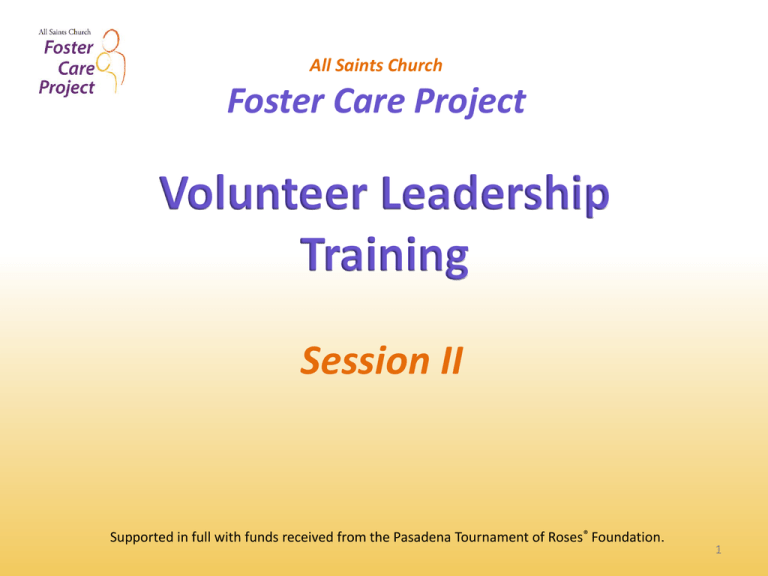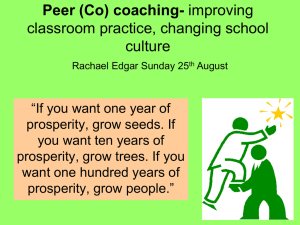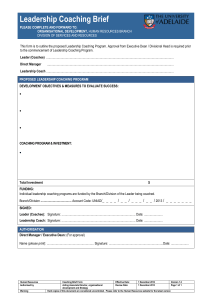Foster Care Training II - Saints | Foster Care Project
advertisement

All Saints Church Foster Care Project Volunteer Leadership Training Session II Supported in full with funds received from the Pasadena Tournament of Roses® Foundation. 1 The Foster Care System Leadership ASC Foster Care Project: Session II 2 ASC-FCP Training Part II: Objectives Support and continue learning from Session 1 Deepen listening skills of leaders (and mentors) in their work with FCP agencies and children to increase accuracy and build trust Develop the leadership skill of partnership coaching to be used in working with volunteers 3 Check-In What thoughts or insights have you had since Session #1? What questions arose? 4 Skilled Listening As A Leadership Skill Benefits of skilled listening Accuracy of information exchange increases Defensiveness (on part of speaker) decreases Credibility of listener is enhanced Communicates value and fairness Listening Exercise 1 5 This Is Your Mind When Listening The average person talks at _______ words per minute. The average person processes _______ words per minute. The average person can give undivided attention to a talker for how many seconds/minutes/hours? When hearing a problem the average person wants to respond by______. If you are speaking and I am listening, I can tell you are getting ready to interrupt when you ______. 6 Basic Listening Review Listen with a genuine sense of curiosity Attend to the whole message—the tone, the energy, the facial and body language Keep your body calm, especially hands and feet Use eye contact effectively 7 Consider Mirroring To Build Trust Direct mirroring Reverse mirroring Testing for trust levels 8 Send A Strong Message You Are Listening Stop talking; shift mind to listening mode Shift body to listening mode: Breathe from the diaphragm Relax facial muscles, especially around the eyes Pause before talking On average, a person waits _____ seconds before talking Some work styles need 4-5 seconds to talk Credibility as listener rises with pause Resist interrupting, defending or solving-- or tangent responses 9 Responding To A Speaker As speakers, we often do not give a complete or clear message when we talk; we start in the middle of an idea or we assume understanding. As listeners we may need to elicit more information. For whose benefit are we doing this? The speaker – to help her clarify, or explore new, thoughts Ours – to get a more complete picture 10 Responding To A Speaker Encourage them to continue talking -- nod, “hmmm” -- a short paraphrase of what they said Encourage them to continue thinking Ask a clarifying question: Did, Are, Is, Ask a probing question: How, Why, What, Which 11 Practices That Detract From Your Deeper Understanding Of Intent: Asking multiple questions (cluster questions) Using multiple-choice questions, especially with a slant Asking a question and then continuing to talk Leading questions that signal what you want to hear Ex. Don’t you think…..? Did you ever think about…? Wouldn’t you agree….? 12 Increase Your Listening Effectiveness Be aware of the Left Hand Column dialogue Avoid arguing in your head Coach yourself to stay in the moment Listen for what is not being said Stay open to where the message is going Make a note to self if needed 13 Listening Exercise 2 In pairs A talks about a current concern she has in any part of her life that would benefit from further thinking. B listens, using her best practices in listening. Guidelines: A continues talking as long as she believes she is being heard. B encourages A’s talking. B may ask questions when appropriate. B may not give advice, even when the exercise is over. 14 Listening Exercise Debrief A When did I feel most heard? What did the listener do that supported my talking? What did the listener do that did not support my talking? B What did I learn about myself as a listener? Reverse roles and repeat the exercise. 15 Partnership Coaching This work is based on the article “Partnership Coaching” by Diane Cory and Rebecca Bradley, The Systems Thinker, vol. 9, number 4, May 1998. See link to this article on page 19 Resources. Partnership Coaching Based on the assumption that the coachee already has the knowledge within himself to make a decision. Focuses on supporting the other’s success in reaching decisions and solving problems in a way they can believe in and own. Does not require a caped-hero or saving presence. 17 Assumptions At The Base Of Coaching We learn best through our own discoveries and exploration. We learn best in a safe and supported environment, where our learning differences are honored. We work best when we know the other person is on our side. The person who does the work does the learning. 18 We work best when we can reduce the internal critical dialogue in our head and stay focused on the details of the current situation and on what is observable. A coach and a good process can help us do that. 19 Feedback Feedback is given after the coachee has had time to reflect on what is working and what is not and what she is considering doing. It is done to support and increase self-awareness and focus. It is given with permission from the coachee. 20 Four Step Coaching— Using Partnership Coaching Process Set Goal Assess Current Reality Brainstorm Decide Next Steps 21 Questions To Use In Coaching That Keep The Focus On The Coachee What do you think about it? What would be an example of that? Help me understand who (or what…)…. How would I know that if I were in the room? What does that look like? (ex. anger, mean, awesome) What do you think happened? What would make that work for you? What about that doesn’t work for you? 22 Flash Coaching Set Goal What do you want (to happen, change, talk about)? What will that bring you? Assess Current Reality What is happening now? What is getting in the way? Brainstorm Options What might you do? What else might you do? Decide Next What WILL you do? Steps 23 Questions To Support Flash Coaching What would you like to talk about? What is happening now? What have you observed? What have you tried? What do you want to target long-term? What would start that journey? How would you know things are getting better? What are some options? What is the most powerful next step? What will it take for you to make that step? What can I do as a coach/mentor to help you? 24 Self Coaching Questions To Use During A Coaching Session What is happening right now? Where is my coachee’s focus? How much interference is she experiencing? Where is it coming from? What happened with her body language (when I said that)? What cues does she give me to sit quietly and let her think? What judgments appeared in my thinking? What worked and what didn’t work for us in this session? 25 Flash Coaching Exercise In the same pairs used for the Listening Exercise 2 A starts as coach B acts as coachee Follow the Flash Coaching template (on card) Time: _______ Debrief in group. Reverse Roles 26 Partnership Coaching Summary Where and when could we use Partnership Coaching? With what parts of the process am I most comfortable? Least comfortable? How can I strengthen my skills in this? How will I know I am improving? 27 Session Assessment What worked well for me and supported my learning? What could be changed or paid attention to that would better support my learning? What actions of my colleagues here do I want to “appreciate” ? 28






